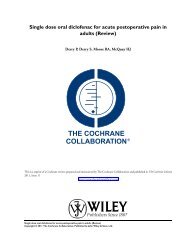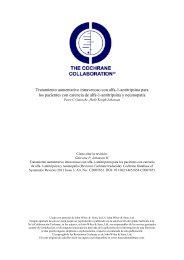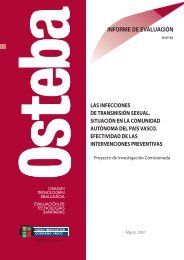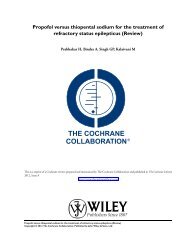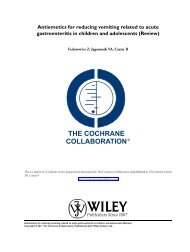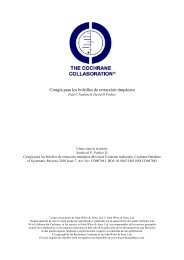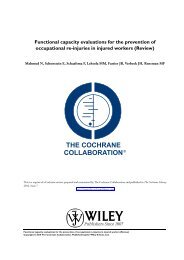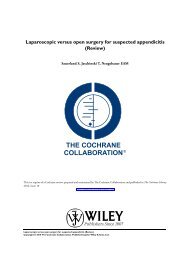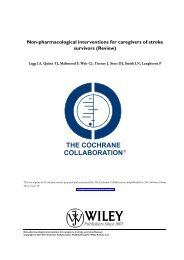Physical fitness training for stroke patients (Review) - Update Software
Physical fitness training for stroke patients (Review) - Update Software
Physical fitness training for stroke patients (Review) - Update Software
Create successful ePaper yourself
Turn your PDF publications into a flip-book with our unique Google optimized e-Paper software.
Ivey (B)<br />
Trial name or title Strength <strong>training</strong> <strong>for</strong> skeletal muscle adaptation after <strong>stroke</strong><br />
Methods Randomised clinical trial; parallel assignment; open label<br />
Participants 52 participants<br />
Inclusion criteria: men and women aged 40 to 85 years, ?6 months post <strong>stroke</strong><br />
Completion of rehabilitation<br />
Interventions Intervention: lower extremity strength <strong>training</strong> (leg extension, press and curl), 45 to 60 minutes per day, 3<br />
days per week <strong>for</strong> 3 months<br />
Control: active and passive upper and lower body stretching and range of motion, 45 to 60 minutes per day,<br />
3 days per week <strong>for</strong> 3 months<br />
Outcomes VO2 peak; bilateral single limb strength testing (leg extension and leg press); bilateral single limb muscle<br />
endurance (static and dynamic); mobility (timed 10-metre and 6-minute walks); Berg Balance Scale<br />
Starting date Start: April 2009<br />
Completion: March 2012<br />
Contact in<strong>for</strong>mation Fred Ivey, VA Maryland Health Care System, Baltimore, USA<br />
Notes NCT00827827<br />
Luft<br />
Trial name or title Structural neuroplasticity associated with aerobic treadmill <strong>training</strong> in geriatric chronic <strong>stroke</strong> survivors<br />
Methods Randomised clinical trial; parallel assignment; open label<br />
Participants 40 <strong>patients</strong> aged over 60 years with lower extremity paresis after a first-ever clinical <strong>stroke</strong> longer than 6<br />
months prior to study inclusion will be recruited<br />
Inclusion criteria: women and men aged > 60 years; first-ever ischaemic <strong>stroke</strong> at least prior 6 months;<br />
all conventional inpatient and outpatient physical therapy completed; residual hemiparetic gait disturbance<br />
adequate language and neurocognitive function to<br />
participate in exercise <strong>training</strong> and testing<br />
Exclusion criteria: already per<strong>for</strong>ming > 20 minutes aerobic exercise 3 times a week; alcohol consumption ><br />
2 oz liquor, or 2 x 4 oz glasses of wine, or 2 x 12 oz cans of beer per day; cardiac history of unstable angina,<br />
recent (< 3 months) myocardial infarction, congestive heart failure (New York Heart Association category II)<br />
, haemodynamically significant valvular dysfunction; medical history of recent hospitalisation (< 3 months)<br />
<strong>for</strong> severe medical disease: symptomatic peripheral arterial occlusive disease, orthopaedic or chronic pain<br />
conditions restricting exercise, pulmonary or renal failure, active cancer,poorly controlled hypertension (><br />
160/100) or diabetes mellitis (fasting glucose >180 mg/dl, HbA1C > 10%); neurological history of dementia,<br />
receptive or global aphasia that confounds testing and <strong>training</strong> (operationally defined as unable to follow 2point<br />
commands), cognitive deficits (other than dementia and aphasia, as above), non-<strong>stroke</strong> neuromuscular<br />
disorder restricting exercise (e.g. Parkinson’s syndrome), untreated major depression; exclusion criteria <strong>for</strong><br />
magnetic resonance imaging scanning (metal implants such as pacemakers, claustrophobia, etc)<br />
<strong>Physical</strong> <strong>fitness</strong> <strong>training</strong> <strong>for</strong> <strong>stroke</strong> <strong>patients</strong> (<strong>Review</strong>)<br />
Copyright © 2011 The Cochrane Collaboration. Published by John Wiley & Sons, Ltd.<br />
82



